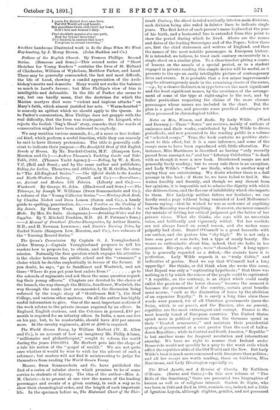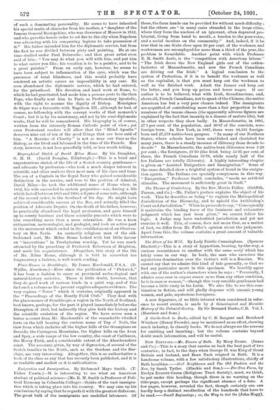The Blind Apostle, and A heroine of Charity. By Kathleen
O'Meara. (Burns and Oates.)—In this new volume of "The Bells of the Sanctuary," there are presented two biographies of human as well as of religious interest. Gaston do &gar, who was born in 1820 and died in 1880, reminds ono, indeed, not a little of Ignatius Loyola, although slighter, gentler, and not possessed of such a dominating personality. He seems to have inherited his special traits of character from his mother, a " daughter of the famous General Rostopchine, who was Governor of Moscow in 1812, and who gave the heroic order to set fire to the city when Napoleon was advancing with his conquering legions to take possession of it." His father intended him for the diplomatic service, but from the first he was divided between piety and painting. He at one time studied under Paul Delaroche ; and that great artist even said of him : " You may do what you will with him, and put him to what career you like; his vocation is to be a painter, and to be a great painter." From an early age, however, he seems to have been subject to inflammation of the eyes, which was the precursor of total blindness, and this would probably have rendered an artistic career an impossibility in any case. He soon abandoned the diplomatic service, which he had entered, for the priesthood. His devotion and bard work at Rome, to which he had gravitated, had made him a persona grata to the then Pope, who finally sent him to Paris as Prothonotary Apostolic, with the right to assume the dignity of Bishop. Monsignor de Segur was a favourite with Napoleon III., although he had, of course, no fellowship with the corrupt works of that monarch's Court ; but it is by his missionary, and not by his semi-diplomatic works, that he will be remembered. His biography is, a course, written from the intensely Roman Catholic point of view ; yet even Protestant readers will allow that the " Blind Apostle " deserves nine out of ten of the good things that are here said of him. "A Heroine of Charity" is not so near our time as the Bishop, as she lived and laboured in the time of the Fronde. Her story, however, is not less gracefully told, or less worth telling.



































 Previous page
Previous page